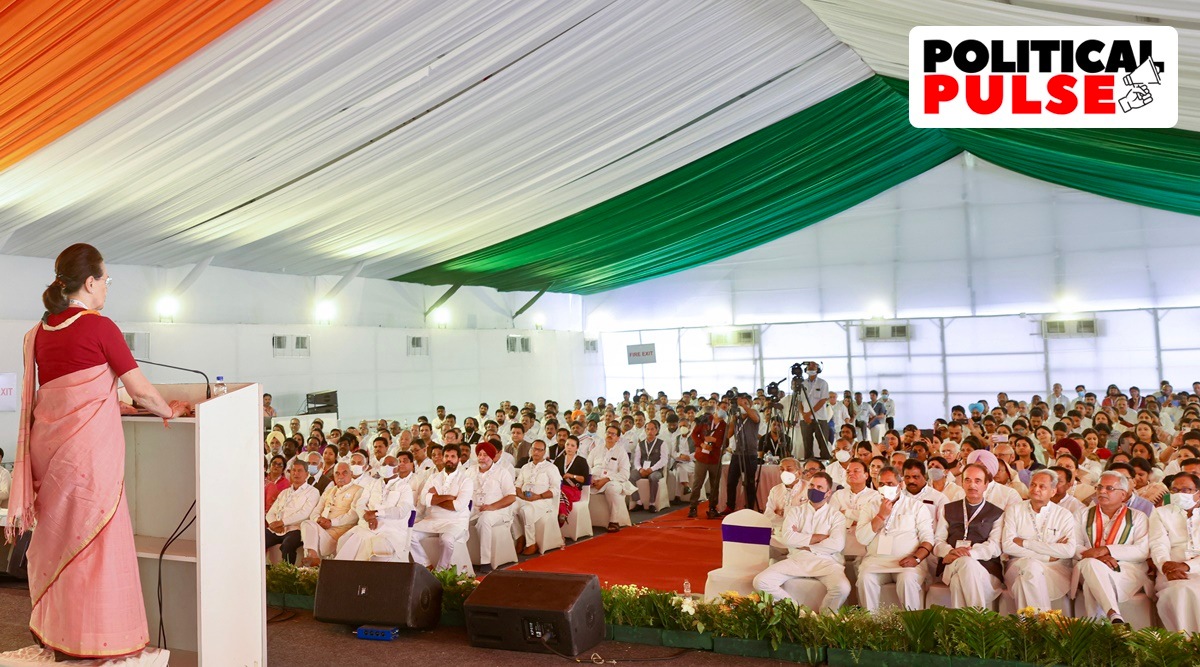 The Congress has organised a Chintan Shivir or brainstorming session to bring about organisational changes in the party. (Photo: AICC)
The Congress has organised a Chintan Shivir or brainstorming session to bring about organisational changes in the party. (Photo: AICC)Keen to regain the support of Dalits, tribals, OBCs and minorities, the Congress is thinking about demanding reservation for SC, ST and OBCs in the private sector and reservation for OBCs in Parliament and Assemblies. Interestingly, it is also discussing a proposal to demand quota within quota for SC, ST and other backward classes (OBCs) in the Women’s Reservation Bill, which had been hanging fire for several years.
The Women’s Reservation Bill to reserve one-third of all seats for women in the Lok Sabha and the state legislative assemblies was passed by Rajya Sabha in 2010 but the UPA government could not take it forward due to strong opposition from SP’s Mulayam Singh Yadav, RJD’s Lalu Prasad Yadav and the then JD(U) chief, Sharad Yadav, who had demanded ‘quota within quota’ for SC, ST, OBCs and minorities in the bill.
The Congress had then strongly resisted the idea.
Twelve years later, the Congress – with its vote bank shrunk and electoral influence considerably eroded – is now thinking about changing its stand and demanding quota within quota which it had once opposed. At the Chintan Shivir in Udaipur, a panel on social justice and empowerment set up by the Congress president and headed by Salman Khurshid has proposed that the Women’s Reservation Bill should have quota within quota. It is to be seen whether the demand will find a reflection in the Udaipur declaration that the party will adopt Sunday.
Best of Express Premium
Not just that, the panel wants the Congress to take a stand and demand a caste-based census of all communities, a central legislation on SC/ST sub-plan and similar legislations at the state level, among others. “The party should push for passage of the Women’s Reservation Bill but there shall be a quota within quota… There should be proportionate representation for SC, ST and OBC women,” said Congress leader K Raju, one of the members of the group.
Khurshid said there is no inconsistency on the part of the party regarding quota within quota in the Women’s Reservation Bill. “We moved on from that position where we had strategically felt that the quota for women should come first,” he said.
“Sometimes you have to push legislation strategically. We were committed to a quota for women. The problem about quota within a quota was that we had assumed that there would not be easy agreement and consensus on that. And as a result, we would lose out on the reservations for women at that stage. Therefore, a conscious, strategic decision was taken that let’s get the quota (for women) first and then we will see about further segmentation,” Khurshid added.
“Now we have lost a lot of time. And politics has also undergone a very, very important significant change since then. We do believe that now is the right time to make it very clear where you stand. We stand for women participating in a fulsome manner… in the sense… that women from all categories should be able to participate. We don’t want any people to believe that there is a hidden agenda that you bring in women but you bring in women only who find it easy to get elected. Therefore, after thoughtful consideration… and inputs that we got from all our colleagues… and from people from the social sector we came to the conclusion that we should recommend to the CWC that now the time has come to take the bull by the horns that make sure that we get quota within quota all pushed at one go,” Khurshid said.
Senior Congress leader Kumari Selja said the UPA could not pass it then because of many contradictions in the coalition.
The group has also recommended a series of organisational reforms to “show to the weaker sections that the party is committed to SC, ST, OBCs and minorities”.
The proposals include setting up a social advisory council in the party to closely examine social justice-related issues that the party has to focus on and raise, implementing 50 per cent reservation for leaders from SC, ST, OBCs and minorities at all levels, from the booth level to the Congress Working Committee – up from the present 20 per cent enshrined in the party’s constitution – giving more representation to various sub-castes within these communities and calling of a special session of the CWC, PCCs and district Congress committees once in six months to discuss the issues concerning SC, ST and OBCs.
- The Indian Express website has been rated GREEN for its credibility and trustworthiness by Newsguard, a global service that rates news sources for their journalistic standards.

